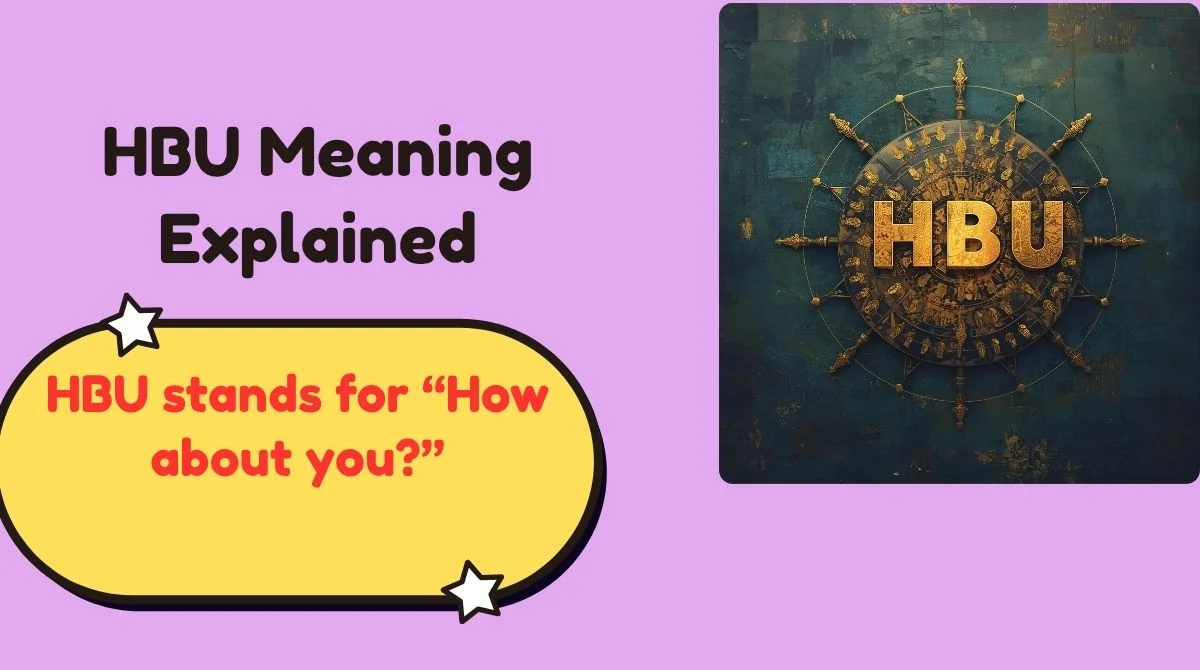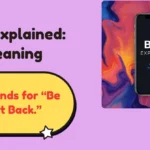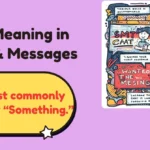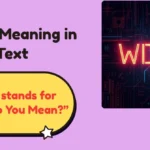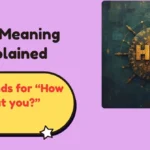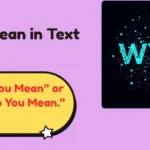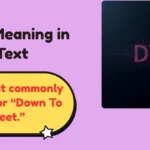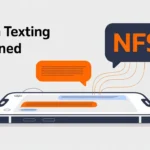If you’ve ever received a text like “Hey! How’s your day? HBU?” and paused for a second—don’t worry, you’re not alone. The abbreviation HBU shows up everywhere these days, from text messages to social media replies. But what exactly does it mean, and when should you use it?
This complete guide breaks down the meaning of HBU, its context, tone, and even when not to use it.
You’ll also learn smarter, more professional alternatives so your messages always sound warm, friendly, and appropriate.
What Does “HBU” Mean in Texting and Online Chats?
Simply put, HBU stands for “How about you?”
It’s a quick way to turn the conversation back to the other person after sharing something about yourself.
For example:
You: “I’m chilling at home watching Netflix. HBU?”
Friend: “Same here, just relaxing before work tomorrow.”
HBU is short, friendly, and easy to type. That’s why it’s common in texts, DMs, gaming chats, and social media comments.
But remember: while it’s casual and fun, HBU is best used in informal settings. It works perfectly when chatting with friends or peers—but not so much in professional emails.
The Grammar and Linguistics Behind “HBU”
The rise of abbreviations like HBU is part of how digital communication has reshaped the English language.
Here’s why abbreviations thrive online:
- Speed: People type fast on mobile devices and want to save time.
- Simplicity: Short words reduce effort and keep messages concise.
- Familiarity: Certain abbreviations (like LOL, BTW, WBU) have become part of everyday talk.
In essence, HBU reflects how humans naturally adapt language for efficiency. It’s a linguistic shortcut—informal, but still clear in meaning.
However, keep in mind that tone can be lost in text. Without voice inflection or facial cues, what sounds friendly in person might come off as blunt on screen.
When to Use “HBU” — Tone and Context Matter
Tone plays a big role in how “HBU” is perceived. It can sound warm and engaging in one context, or distant and robotic in another.
Let’s look at how context changes meaning:
| Context | Example Message | Tone |
|---|---|---|
| Close friends | “Just got home. HBU?” | Casual, friendly |
| New acquaintance | “I usually hike on weekends. HBU?” | Curious, polite |
| Romantic interest | “Missed you today. HBU?” | Warm, caring |
| Work colleague | “I’m reviewing the report now. HBU?” | Slightly too casual |
💡 Tip: Use “HBU” only when the relationship is informal or friendly enough for abbreviations.
When NOT to Use “HBU”
Even though HBU feels casual and natural, there are times when it’s better left unsent.
Avoid using HBU when:
- You’re emailing a client, professor, or supervisor.
- You’re communicating in formal or academic settings.
- You’re unsure how the other person perceives texting shorthand.
- The conversation tone is serious or emotional, where clarity matters.
For instance, if someone shares bad news, replying with “That’s sad 😔 HBU?” may seem insensitive. Instead, respond empathetically before shifting focus.
Is “HBU” Appropriate in Professional or Academic Settings?
Short answer: No.
In professional communication—emails, business chats, or official messages—clarity and tone matter more than speed.
Here’s how different approaches compare:
| Setting | Avoid | Better Alternative |
|---|---|---|
| Work email | “I finished my part. HBU?” | “I’ve completed my section. How are things progressing on your end?” |
| Academic chat | “I’ll join later. HBU?” | “I’ll log in shortly. Will you be joining too?” |
| Client follow-up | “Meeting done. HBU?” | “The meeting went well. How’s everything from your side?” |
In short, HBU feels too relaxed for professional spaces. Go with full, clear sentences that maintain respect.
Smart Alternatives to “HBU” (Depending on the Situation)
Abbreviations aren’t your only option. Depending on who you’re talking to, you can switch up your tone with the right alternative.
🟢 Casual Alternatives (Friends / Peers)
Perfect for group chats or casual texts:
- “What about you?”
- “You good?”
- “How’s your day going?”
- “Same here—how about you?”
- “Your turn 😄”
🟡 Polite Yet Friendly (Acquaintances)
Good for classmates, neighbors, or casual colleagues:
- “And yourself?”
- “How are things with you?”
- “What have you been up to lately?”
- “How’s everything on your end?”
🔵 Formal or Professional (Work / Emails)
When you need to sound polished and respectful:
- “How are things going with you?”
- “I’d love to hear your thoughts.”
- “How’s your progress on this task?”
- “Would you mind sharing your feedback?”
By adjusting your tone, you show emotional intelligence and adaptability—qualities that make communication smoother and more effective.
Why People Still Love Using “HBU”
Despite being informal, HBU remains wildly popular—and for good reason.
Here’s why people keep using it:
- It feels conversational. The phrase keeps the dialogue balanced.
- It’s inclusive. It invites the other person to share.
- It saves time. Perfect for fast-paced digital communication.
- It’s friendly and familiar. Especially among younger generations.
“Digital slang like HBU isn’t killing language—it’s evolving it.”
— Linguist David Crystal
So, while “HBU” may not be suited for every setting, it’s a reflection of how online culture has made conversation more immediate and connected.
“HBU” vs. “WBU” — Subtle but Important Differences
While both abbreviations mean something similar, their tone and usage differ slightly.
| Term | Full Form | Tone | Usage Context |
|---|---|---|---|
| HBU | How about you? | Warm, polite | Works with anyone you’re comfortable with |
| WBU | What about you? | More casual, direct | Common among close friends or gamers |
- HBU sounds more neutral and polite.
- WBU leans slightly more informal and sometimes abrupt.
💬 Example:
- “I’m free tonight. HBU?” → sounds friendly and curious.
- “I’m free tonight. WBU?” → sounds quick and casual.
Both work—but choose the one that matches your tone and relationship with the person.
Generational & Cultural Nuances in Using “HBU”
Language evolves differently across age groups and cultures.
- Gen Z uses “HBU” and similar abbreviations naturally. For them, it’s part of daily texting slang.
- Millennials use it casually but often switch to full phrases in formal settings.
- Older generations might not recognize it immediately or might perceive it as too informal.
Cultural differences also play a role:
- In the US, abbreviations like “HBU” are common and accepted in casual texts.
- In the UK, tone tends to be slightly more reserved; full phrases like “How about you?” are preferred.
- In Asia, especially in business settings, shorthand may seem disrespectful or lazy.
Understanding your audience ensures your message lands the way you intend.
The Hidden Power of Tone in Digital Communication
Ever sent a message that got misunderstood? That’s the power—and risk—of tone in texting.
Text removes vocal tone and facial expression, leaving your words open to interpretation.
Here’s how tone shifts with small changes:
| Version | Perceived Tone |
|---|---|
| “HBU” | Neutral, polite |
| “HBU?” | Curious, inviting |
| “HBU!” | Enthusiastic |
| “HBU…” | Tired or uninterested |
| “HBU 🤔” | Thoughtful |
| “HBU 😊” | Warm and friendly |
Adding emojis or punctuation adds emotional clarity—a simple way to make digital messages sound more human.
Real-World Examples: How to Use “HBU” Naturally
Here are a few short case studies showing how “HBU” fits in real-life texting situations.
Case Study 1: Friends Catching Up
Alex: “Just got home from the gym. HBU?”
Jordan: “Same here, I’m exhausted 😅.”
Takeaway: Perfectly casual, friendly tone.
Case Study 2: Dating Context
Mia: “Had dinner with friends tonight. HBU?”
Ethan: “Stayed in, cooked something new.”
Takeaway: Keeps conversation flowing naturally.
Case Study 3: Professional Slip-Up
Employee: “Finished the report. HBU?”
Manager: “Please avoid abbreviations in business messages.”
Takeaway: Abbreviations can appear too informal at work.
Case Study 4: Social Media Reply
Post: “Finally on vacation! 🏖️ HBU guys?”
Comment: “Jealous! Still stuck at work 😭”
Takeaway: Great use in group or public posts.
Frequently Asked Questions (FAQ)
What does HBU stand for in chat?
It means “How about you?”—a friendly way to ask someone the same question they asked or to return interest in a conversation.
Is HBU rude or impolite?
Not at all—when used with friends or peers. It can sound lazy or cold in formal chats, so read the context first.
Can I use HBU in an email?
Avoid it in professional or formal emails. Use full sentences like “How are things on your end?” instead.
What’s better: HBU or WBU?
Both mean the same thing, but HBU is slightly warmer and more polite. WBU sounds quicker and more casual.
Is it okay to use HBU in voice messages or social media comments?
Yes, if your tone is friendly. Abbreviations like “HBU” are common on platforms like Instagram, TikTok, and Twitter where brevity is normal.
Key Takeaways: Read the Room Before You Text
Before typing “HBU,” pause and consider:
- Who you’re texting
- The tone of the conversation
- Whether it’s personal or professional
A simple “How about you?” can go a long way in showing warmth and clarity, especially when you want your message to sound genuine.
Final Thought: Keep It Personal, Not Robotic
Language isn’t just about words—it’s about connection.
“HBU” might be short, but it carries meaning far beyond its letters. Whether you text it to a friend or type the full phrase in a professional email, your tone, timing, and sincerity make all the difference.
So next time someone asks, “How are you?” feel free to say, “I’m good—HBU?”
Just make sure it sounds like you.
